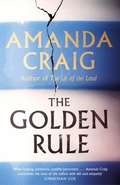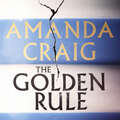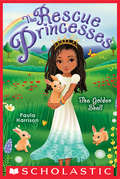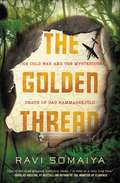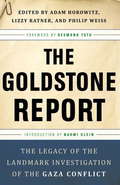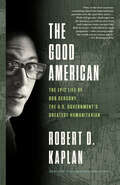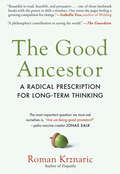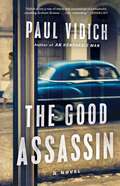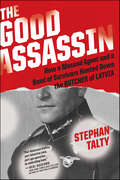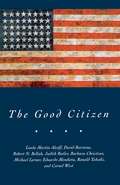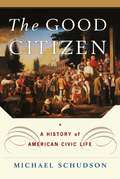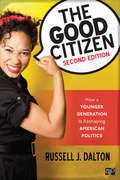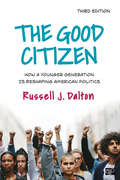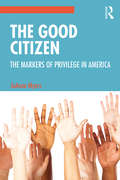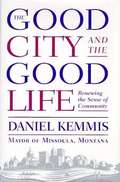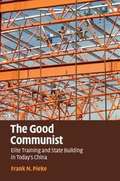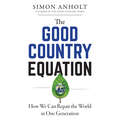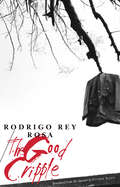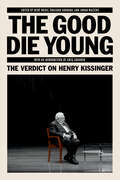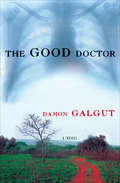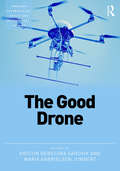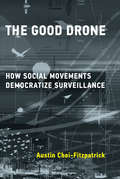- Table View
- List View
The Golden Rule: Longlisted for the Women's Prize 2021
by Amanda CraigA Times, Sunday Times, Observer, Daily Mail and Financial Times Best Book of 2020 Pick'A highly enjoyable story about female resilience and finding fulfilment on your own terms' Sunday Times'An irresistible summer read' Guardian Book of the Day'A typically sharp and hugely satisfying page-turner' Daily MailShe's such a skilful storyteller' Bernardine EvaristoWhen Hannah is invited into the First-Class carriage of the London to Penzance train by Jinni, she walks into a spider's web. Now a poor young single mother, Hannah once escaped Cornwall to go to university. But once she married Jake and had his child, her dreams were crushed into bitter disillusion. Her husband has left her for Eve, rich and childless, and Hannah has been surviving by becoming a cleaner in London. Jinni is equally angry and bitter, and in the course of their journey the two women agree to murder each other's husbands. After all, they are strangers on a train - who could possibly connect them?But when Hannah goes to Jinni's husband's home the next night, she finds Stan, a huge, hairy, ugly drunk who has his own problems - not least the care of a half-ruined house and garden. He claims Jinni is a very different person to the one who has persuaded Hannah to commit a terrible crime. Who is telling the truth - and who is the real victim?Praise for Amanda Craig'Terrific, page-turning, slyly funny' India Knight'As satisfying a novel as I have read in years' Sarah Perry'Amanda Craig is one of the most brilliant and entertaining novelists now working in Britain' Alison Lurie
The Golden Rule: Longlisted for the Women's Prize 2021
by Amanda CraigA Times, Sunday Times, Observer, Daily Mail and Financial Times Best Book of 2020 Pick'A highly enjoyable story about female resilience and finding fulfilment on your own terms' Sunday Times'An irresistible summer read' Guardian Book of the Day'A typically sharp and hugely satisfying page-turner' Daily MailShe's such a skilful storyteller' Bernardine EvaristoWhen Hannah is invited into the First-Class carriage of the London to Penzance train by Jinni, she walks into a spider's web. Now a poor young single mother, Hannah once escaped Cornwall to go to university. But once she married Jake and had his child, her dreams were crushed into bitter disillusion. Her husband has left her for Eve, rich and childless, and Hannah has been surviving by becoming a cleaner in London. Jinni is equally angry and bitter, and in the course of their journey the two women agree to murder each other's husbands. After all, they are strangers on a train - who could possibly connect them?But when Hannah goes to Jinni's husband's home the next night, she finds Stan, a huge, hairy, ugly drunk who has his own problems - not least the care of a half-ruined house and garden. He claims Jinni is a very different person to the one who has persuaded Hannah to commit a terrible crime. Who is telling the truth - and who is the real victim?Praise for Amanda Craig'Terrific, page-turning, slyly funny' India Knight'As satisfying a novel as I have read in years' Sarah Perry'Amanda Craig is one of the most brilliant and entertaining novelists now working in Britain' Alison Lurie
The Golden Rule: Longlisted for the Women's Prize 2021
by Amanda CraigLonglisted for the Women's Prize 2021A Times, Sunday Times, Observer, Daily Mail and Financial Times Best Book of 2020 Pick'A highly enjoyable story about female resilience and finding fulfilment on your own terms' Sunday Times'An irresistible summer read' Guardian Book of the Day'A typically sharp and hugely satisfying page-turner' Daily MailShe's such a skilful storyteller' Bernardine Evaristo When Hannah is invited into the First-Class carriage of the London to Penzance train by Jinni, she walks into a spider's web. Now a poor young single mother, Hannah once escaped Cornwall to go to university. But once she married Jake and had his child, her dreams were crushed into bitter disillusion. Her husband has left her for Eve, rich and childless, and Hannah has been surviving by becoming a cleaner in London. Jinni is equally angry and bitter, and in the course of their journey the two women agree to murder each other's husbands. After all, they are strangers on a train - who could possibly connect them? But when Hannah goes to Jinni's husband's home the next night, she finds Stan, a huge, hairy, ugly drunk who has his own problems - not least the care of a half-ruined house and garden. He claims Jinni is a very different person to the one who has persuaded Hannah to commit a terrible crime. Who is telling the truth - and who is the real victim?Praise for Amanda Craig'Terrific, page-turning, slyly funny' India Knight'As satisfying a novel as I have read in years' Sarah Perry'Amanda Craig is one of the most brilliant and entertaining novelists now working in Britain' Alison Lurie
The Golden Shell: The Golden Shell (The Rescue Princesses #12)
by Paula HarrisonThese are no ordinary princesses-- they're Rescue Princesses!The Rescue Princesses are going to Princess School! They're excited, but also a little worried--will they still have time to help animals in need? Princess Ella has lost her pet rabbit. She hopes that her new friends, the Rescue Princesses, are just the girls to bring her bunny home.
The Golden Thread: The Cold War and the Mysterious Death of Dag Hammarskj¿ld
by Ravi SomaiyaA true story of spies and intrigue surrounding one of the most enduring unsolved mysteries of the 20th century, investigative reporter Ravi Somaiya uncovers the story behind the death of renowned diplomat and UN Secretary General Dag Hammarskjöld.On September 17, 1961, Dag Hammarskjöld boarded a Douglas DC6 propeller plane on the sweltering tarmac of the airport in Leopoldville, the capital of the Congo. Hours later, he would be found dead in an African jungle with an ace of spades playing card placed on his body.Hammarskjöld had been the head of the United Nations for nine years. He was legendary for his dedication to peace on earth. But dark forces circled him: Powerful and connected groups from an array of nations and organizations -- including the CIA, the KGB, underground militant groups, business tycoons, and others -- were determined to see Hammarskjöld fail. A riveting work of investigative journalism based on never-before-seen evidence, recently revealed firsthand accounts, and groundbreaking new interviews, The Golden Thread reveals the truth behind one of the great murder mysteries of the Cold War. p.p1 {margin: 0.0px 0.0px 0.0px 0.0px; font: 12.0px 'Times New Roman'} p.p2 {margin: 0.0px 0.0px 0.0px 0.0px; font: 12.0px 'Times New Roman'; min-height: 15.0px}
The Goldstone Report: The Legacy of the Landmark Investigation of the Gaza Conflict
by Philip Weiss Editors Adam Horowitz Lizzy RatnerThe controversialOCoand vitalOCoreport with new essays and expert analysis on the truth behind IsraelOCOs incursion into Gaza and the atrocities committed by both sides.
The Good American: The Epic Life of Bob Gersony, the U.S. Government's Greatest Humanitarian
by Robert D. KaplanFrom the New York Times bestselling author of The Revenge of Geography comes a sweeping yet intimate story of the most influential humanitarian you&’ve never heard of—Bob Gersony, who spent four decades in crisis zones around the world.&“This graceful study of a courageous and humble man reminds us that history can be made, and lives can be saved, by diplomats who know how to reconcile the good with the possible.&”—Timothy Snyder, author of The Road to Unfreedom and On Tyranny In his long career as an acclaimed journalist covering the &“hot&” moments of the Cold War and its aftermath, bestselling author Robert D. Kaplan often found himself crossing paths with Bob Gersony, a consultant for the U.S. State Department whose quiet dedication and consequential work made a deep impression on Kaplan.Gersony, a high school dropout later awarded a Bronze Star for his service in Vietnam, conducted on-the-ground research for the U.S. government in virtually every war and natural-disaster zone in the world. In Thailand, Central and South America, Sudan, Chad, Mozambique, Rwanda, Gaza, Bosnia, North Korea, Iraq, and beyond, Gersony never flinched from entering dangerous areas that diplomats could not reach, sometimes risking his own life. Gersony&’s behind-the scenes fact-finding, which included interviews with hundreds of refugees and displaced persons from each war zone and natural-disaster area, often challenged the assumptions and received wisdom of the powers that be, on both the left and the right. In nearly every case, his advice and recommendations made American policy at once smarter and more humane—often dramatically so.In Gersony, Kaplan saw a powerful example of how American diplomacy should be conducted. In a work that exhibits Kaplan&’s signature talent for combining travel and geography with sharp political analysis, The Good American tells Gersony&’s powerful life story. Set during the State Department&’s golden age, this is a story about the loneliness, sweat, and tears and the genuine courage that characterized Gersony&’s work in far-flung places. It is also a celebration of ground-level reporting: a page-turning demonstration, by one of our finest geopolitical thinkers, of how getting an up-close, worm&’s-eye view of crises and applying sound reason can elicit world-changing results.
The Good Ancestor: A Radical Prescription For Long-term Thinking
by Roman KrznaricFrom leading philosopher Roman Krznaric, an urgent call to save ourselves and our planet by getting to the root of the current crisis—society’s extreme short-sightedness As heard on NPR’s TED Radio Hour When Jonas Salk developed the polio vaccine, he refused to patent it—forgoing profit so that more lives could be saved. His radical generosity to future generations should inspire us, but leading philosopher Roman Krznaric sees the opposite happening: Our short-term, exploitative mindsets have “colonized the future,” leaving an inexcusable chasm between the haves and have-nots—and mounting existential threats—that have brought our species to the precipice of disaster. Yet Krznaric sees reason to hope. The urgent struggle for intergenerational justice calls for hugely ambitious solutions, from rewiring our growth-at-all-costs economy to giving voters of future generations a voice in our democracies. But at the heart of all these changes is one we can enact within ourselves: We must trade shortsightedness for long-term thinking. In The Good Ancestor, Krznaric reveals six practical ways we can retrain our brains to think of the long view and to shift our allegiance from this generation to all humanity—to save our planet and our future.
The Good Assassin: A Novel
by Paul Vidich&“The Good Assassin opens up Hemingway&’s Cuba. Possessing Alan Furst&’s attention for period detail and the deft character touches of John Le Carré, Vidich has quickly carved out a place for himself among the very first rank of espionage writers. It&’s a masterful effort and the author&’s best work to date.&” —Michael Harvey, New York Times bestselling author of The Chicago Way &“The Good Assassin is first-rate literary espionage…Author Paul Vidich has evoked not only the intrigue and brutality of Batista&’s Cuba, but the island itself…a masterful work of noir fiction.&” —Susan Isaacs, New York Times bestselling author of A Hint of Strangeness Paul Vidich follows up his acclaimed debut spy thriller An Honorable Man with &“a keen historical adventure from the best noir tradition&” (Elizabeth Kostova, #1 New York Times bestselling author) set in 1950s Cuba, as foreign powers compete to influence the outcome of a revolution.Former CIA Agent George Mueller arrives in Havana in August 1958, during the last months of dictator Fulgencio Batista&’s reign, to look into the activities of Toby Graham—an in-country CIA officer suspected of harboring sympathies for the rebels fighting the unpopular Batista regime. Specifically, Mueller&’s old friend Graham may be putting weapons into the hands of Castro&’s forces, in bold defiance of the United States arms embargo on the island. But when Mueller uncovers a world of deceit as the FBI, CIA, and State Department compete to influence the outcome of the revolution in the face of the brutal dictatorship&’s imminent collapse, he realizes that nothing and no one is what they seem. This is a powerful story of ideals, passions, betrayals, and corrupting political rivalries in the months before Castro&’s march into Havana on New Year&’s Day, 1959. As New York Times bestselling author Michael Harvey raves, &“It&’s a masterful effort and the author&’s best work to date.&”
The Good Assassin: How a Mossad Agent and a Band of Survivors Hunted Down the Butcher of Latvia
by Stephan TaltyInspiration for the hit new podcast "Hunting the Butcher"The untold story of an Israeli spy&’s epic journey to bring the notorious Butcher of Latvia to justice—a case that altered the fates of all ex-Nazis. Before World War II, Herbert Cukurs was a famous figure in his small Latvian city, the &“Charles Lindbergh of his country&”. But he was soon better known as the Butcher of Latvia, a man who murdered some thirty thousand Jews. By 1965, a statute of limitations on Nazi war crimes threatened to expire, potentially absolving ex-Nazis like Cukurs of their crimes. Jacob Medad, the misfit Mossad agent who had previously kidnapped Adolf Eichmann, knew if Cukurs was not captured soon, he may never be brought to justice. In a thrilling undercover operation, Medad traveled to Cukurs&’ new home in Brazil in an elaborate disguise, befriended him, and earned his trust, while negotiations to extend Nazi innocence neared a boiling point.
The Good Citizen
by David Batstone Eduardo MendietaIn The Good Citizen, some of the most eminent contemporary thinkers take up the question of the future of American democracy in an age of globalization, growing civic apathy, corporate unaccountability, and purported fragmentation of the American common identity by identity politics.
The Good Citizen: A History of American Civic Life
by Michael SchudsonIn 1996 less than half of all eligible voters even bothered to vote. Fewer citizens each year follow government and public affairs regularly or even think they should. Is popular sovereignty a failure? Not necessarily, argues Michael Schudson in this provocative and unprecedented history of citizenship in America. Measuring voter turnout or attitudes is a poor approximation of citizenship. The meaning of voting -- and what counts as politics -- has changed dramatically over the course of our history. We have passed through three distinct eras in the definition and demonstration of good citizenship, and we are now struggling to find a footing in a fourth. When the nation was founded, being a citizen meant little more than for property-owning white males to delegate authority to a local gentleman -- and accept his complimentary glass of rum on election day. This "politics of assent" gave way early in the nineteenth century to a "politics of parties. " Parties conducted elaborate campaigns of torchlight processions and monster meetings; voting day was filled with banter, banners, fighting, and drinking. Party ticket peddlers handed voters preprinted tickets to place in the ballot box before stepping over to the tavern for a few dollars' reward from the party. We now call this corruption. At the time, it was called loyalty. The third model of citizenship, ushered in by Progressive reformers, was a "politics of information. " Campaigning became less emotional and more educational. Voting was by secret ballot. With civil-service reform, parties were limited in the rewards they could bestow. This was the era of the "informed voter. " Under this scheme, the twentieth century has been ruled by everyone, and no one, all at once. Today, after the rights revolution, political participation takes place in schools, at home, at work, and in the courts. We have made "informed citizenship" an overwhelming task. Schudson argues that it is time for a new model, in which we stop expecting everyone to do everything. The new citizenship must rest on citizens who are monitors of political danger rather than walking encyclopedias of governmental news. This fascinating tour of the past makes it possible to imagine a very different -- and much more satisfying -- future.
The Good Citizen: How a Younger Generation Is Reshaping American Politics
by Russell J. DaltonThe Good Citizen uses a new 2014 national opinion survey to describe how Americans’ views of what it means to be a good citizen is changing. Russell J. Dalton shows that contrary to conventional wisdom, younger generations are more politically engaged, more politically tolerant, and more supportive of social justice; the young are creating new norms of citizenship that are leading to a renaissance of democratic participation. The new edition of this groundbreaking work will reshape the way we think about the American public, American youth, and the prospects for contemporary democracy. It describes Americans’ changing citizenship norms, the emergence of the Millennial Generation, how the Internet is changing participation patterns, and a new statistical primer to help students understand the survey findings.
The Good Citizen: How a Younger Generation Is Reshaping American Politics
by Russell J. DaltonThe Good Citizen uses a new 2014 national opinion survey to describe how Americans’ views of what it means to be a good citizen is changing. Russell J. Dalton shows that contrary to conventional wisdom, younger generations are more politically engaged, more politically tolerant, and more supportive of social justice; the young are creating new norms of citizenship that are leading to a renaissance of democratic participation. The new edition of this groundbreaking work will reshape the way we think about the American public, American youth, and the prospects for contemporary democracy. It describes Americans’ changing citizenship norms, the emergence of the Millennial Generation, how the Internet is changing participation patterns, and a new statistical primer to help students understand the survey findings.
The Good Citizen: How a Younger Generation Is Reshaping American Politics
by Russell J. DaltonIn this third edition of The Good Citizen, Russell Dalton uses current national public opinion surveys, including new evidence from 2018 Pew Center survey data, to show how Americans are changing their views on what good citizenship means. It&’s not about recreating the halcyon politics of a generation ago, but recognition that new patterns of citizenship call for new processes and new institutions that reflect the values of the contemporary American public. Trends in participation, tolerance, and policy priorities reflect a younger generation that is more engaged, more tolerant, and more supportive of social justice. The Good Citizen shows how a younger generation is creating new norms of citizenship that are leading to a renaissance of democratic participation. An important comparative chapter in the book showcases cross-national comparisons that further demonstrate the vitality of American democracy.
The Good Citizen: How a Younger Generation Is Reshaping American Politics
by Russell J. DaltonIn this third edition of The Good Citizen, Russell Dalton uses current national public opinion surveys, including new evidence from 2018 Pew Center survey data, to show how Americans are changing their views on what good citizenship means. It&’s not about recreating the halcyon politics of a generation ago, but recognition that new patterns of citizenship call for new processes and new institutions that reflect the values of the contemporary American public. Trends in participation, tolerance, and policy priorities reflect a younger generation that is more engaged, more tolerant, and more supportive of social justice. The Good Citizen shows how a younger generation is creating new norms of citizenship that are leading to a renaissance of democratic participation. An important comparative chapter in the book showcases cross-national comparisons that further demonstrate the vitality of American democracy.
The Good Citizen: The Markers of Privilege in America
by JoAnne MyersUsing applied political theory, JoAnne Myers presents five markers by which citizens become second-class citizens—property, productivity, participation, patriotism, and reproduction. Citizenship is a highly contested status since it grants members political rights and responsibilities. It is contextualized by cultural, political, historical, economic, situational, and place. In the United States, we think of citizenship in principle as democratic, but citizenship is not just a binary status: norms, policies, and laws can mark some citizens as “other.” In The Good Citizen: The Markers of Privilege in America, Myers argues that being marked as not having or achieving these markers is how citizenship is controlled and regulated. To illustrate this argument, each chapter begins with a practical question or myth to ease the reader into the marker being examined. She later articulates the ways in which law and norms and biopower regulates and controls citizens in three policy areas. Myers moves beyond theories of citizen marginalization based on identity politics and intersectionality to provide a new understanding of citizenship practice. The Good Citizen will be of interest to scholars and researchers of politics, sociology, or legal studies of citizenship, and anyone concerned with distributive justice.
The Good City and the Good Life
by Daniel KemmisThe copyright holder and the copyright date were wrong. I've corrected them.
The Good Communist
by Frank N. PiekeHas China become just another capitalist country in a socialist cloak? Will the Chinese Communist Party's rule survive the next ten years of modernization and globalization? Frank Pieke investigates these conundrums in this fascinating account of how government officials are trained for placement in the Chinese Communist Party. Through in-depth interviews with staff members and aspiring trainees, he shows that while the Chinese Communist Party has undergone a radical transformation since the revolutionary years under Mao, it is still incumbent upon cadres, who are selected through a highly rigorous process, to be ideologically and politically committed to the party. It is the lessons learnt through their teachers that shape the political and economic decisions they will make in power. The book offers unique insights into the structure and the ideological culture of the Chinese government, and how it has reinvented itself over the last three decades as a neo-socialist state.
The Good Country Equation: How We Can Repair the World in One Generation
by Simon AnholtWhy doesn't the world work? Why, despite all the power, technology, money and knowledge that humanity has accumulated, are we are still unable to defeat global challenges like climate change, war, poverty, migration, extremism, and inequality? Simon Anholt has spent decades helping countries from Austria to Zambia to improve their international standing. Using colorful descriptions of his experiences--dining with Vladimir Putin at his country home, taking a group of Felipe Calderon's advisors on their first Mexico City subway ride, touring a beautiful new government hospital in Afghanistan that nobody would use because it was in Taliban-controlled territory--he tells how he began finding answers to that question. Ultimately, Anholt hit on the Good Country Equation, a formula for encouraging international cooperation and reinventing education for a globalized era. Anholt even offers a "selfish" argument for cooperation: he shows that it generates goodwill, which in turn translates into increased trade, foreign investment, tourism, talent attraction, and even domestic electoral success. Anholt insists we can change the way countries behave and the way people are educated in a single generation--because that's all the time we have.
The Good Cripple
by Rodrigo Rey RosaThis muscular, starkly impressive novel from Guatemala's premiere young writer fiercely addresses the seemingly endless violence of Latin America. A young man, Juan Luis Luna, is kidnapped in Guatemala City and held at the bottom of a rusty, empty underground fuel tank in an abandoned gas station. The kidnappers demand a ransom; his rich father does not reply. The kidnappers threaten to cut off his son's foot and still hear nothing. They then slice off one of Juan Luis's toes and send it to his father, who still refuses to act. So the next day... The Good Cripple obsessively focused, chilling, allegorical is stunningly explosive. With its enigmatic beginning, however, and its circular relentless structure, the novel is also dense with ideas: can one be whole after mutilation? Can the injured transcend violence? Rodrigo Rey Rosa's style is of a lithe pristine clarity, but beneath that calm surface cruelty, revenge, and diffidence churn darkly away. The Good Cripple is an astonishingly intense book, and as unforgettable as the sight of "the place where the foot had been severed, where a circle of red flesh, now a little black along the edges, could be seen, with a concentric circle of white bone that was both milky and glassy..."
The Good Die Young: The Verdict on Henry Kissinger
by Bhaskar Sunkara René Rojas Jonah Walters"The collection strikes a blackly comic but erudite tone."–Sophia Nguyen, The Washington PostKissinger is dead but his blood-soaked legacy enduresIf the American foreign policy establishment is a grand citadel, then Henry Kissinger is the ghoul haunting its hallways. For half a century, he was an omnipresent figure in war rooms and at press briefings, dutifully shepherding the American empire through successive rounds of growing pains. For multiple generations of anti-war activists, Kissinger personified the depravity of the American war machine.The world Kissinger wrought is the world we live in, where ideal investment conditions are generated from the barrel of a gun. Today, global capitalism and United States hegemony are underwritten by the most powerful military ever devised. Any political vision worth fighting for must promise an end to the cycle of never-ending wars afflicting the world in the twenty-first century. And breaking that cycle means placing the twin evils of capitalism and imperialism in our crosshairs.In this book, Jacobin follows Kissinger&’s fiery trajectory around the world — not because he was evil incarnate, but because he, more than any other public figure, illustrates the links between capitalism, empire, and the feedback loop of endless war-making that still plagues us today.
The Good Doctor: A Novel
by Damon Galgut&“A lovely, lethal, disturbing novel&” of the dashed hopes of post-apartheid South Africa and the small betrayals that doom a friendship (The Guardian). An extraordinary parable of the corruption of the flesh and spirit, The Good Doctor has inspired enthusiastic interest around the world and has assured Damon Galgut&’s place as a major international talent. When Laurence Waters arrives at his new post at a deserted rural hospital, staff physician Frank Eloff is instantly suspicious. Laurence is everything Frank is not—young, optimistic, and full of big ideas. The whole town is beset with new arrivals and the return of old faces. Frank reestablishes a liaison with a woman, one that will have unexpected consequences. A self-made dictator from apartheid days is rumored to be active in cross-border smuggling, and a group of soldiers has moved in to track him, led by a man from Frank&’s own dark past. Laurence sees only possibilities—but in a world where the past is demanding restitution from the present, his ill-starred idealism cannot last. &“Galgut&’s prose, its gentle rhythms and straightforward sentences edging toward revelation, is utterly seductive and suspenseful . . . Galgut is a master of psychological tension. . . . Tragic and brilliant.&” —The Globe and Mail (Toronto)
The Good Drone (Emerging Technologies, Ethics and International Affairs)
by Kristin Bergtora Sandvik Maria Gabrielsen JumbertWhile the military use of drones has been the subject of much scrutiny, the use of drones for humanitarian purposes has so far received little attention. As the starting point for this study, it is argued that the prospect of using drones for humanitarian and other life-saving activities has produced an alternative discourse on drones, dedicated to developing and publicizing the endless possibilities that drones have for "doing good". Furthermore, it is suggested that the Good Drone narrative has been appropriated back into the drone warfare discourse, as a strategy to make war "more human". This book explores the role of the Good Drone as an organizing narrative for political projects, technology development and humanitarian action. Its contribution to the debate is to take stock of the multiple logics and rationales according to which drones are "good", with a primary objective to initiate a critical conversation about the political currency of "good". This study recognizes the many possibilities for the use of drones and takes these possibilities seriously by critically examining the difference the drones' functionalities can make, but also what difference the presence of drones themselves – as unmanned and flying objects – make. Discussed and analysed are the implications for the drone industry, user communities, and the areas of crisis where drones are deployed.
The Good Drone: How Social Movements Democratize Surveillance (Acting with Technology)
by Austin Choi-FitzpatrickHow small-scale drones, satellites, kites, and balloons are used by social movements for the greater good.Drones are famous for doing bad things: weaponized, they implement remote-control war; used for surveillance, they threaten civil liberties and violate privacy. In The Good Drone, Austin Choi-Fitzpatrick examines a different range of uses: the deployment of drones for the greater good. Choi-Fitzpatrick analyzes the way small-scale drones--as well as satellites, kites, and balloons--are used for a great many things, including documenting human rights abuses, estimating demonstration crowd size, supporting anti-poaching advocacy, and advancing climate change research. In fact, he finds, small drones are used disproportionately for good; nonviolent prosocial uses predominate.
